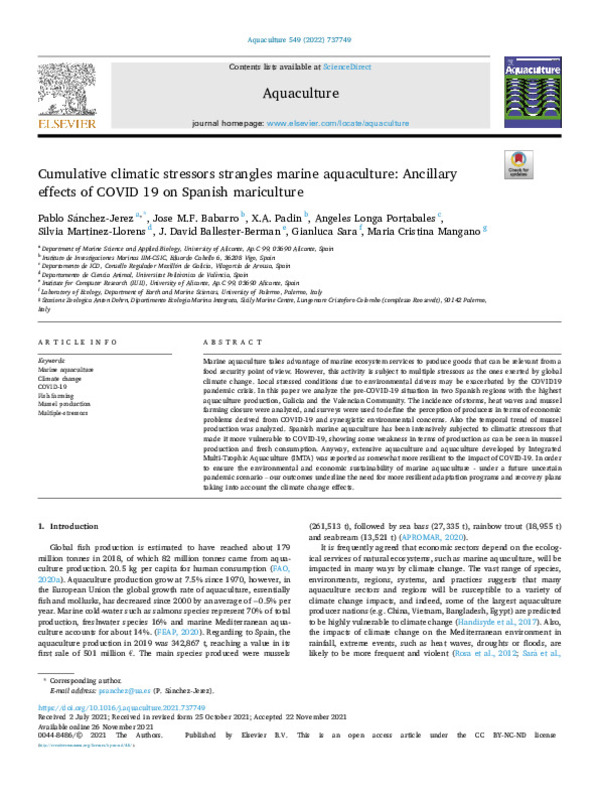JavaScript is disabled for your browser. Some features of this site may not work without it.
Buscar en RiuNet
Listar
Mi cuenta
Estadísticas
Ayuda RiuNet
Admin. UPV
Cumulative climatic stressors strangles marine aquaculture: Ancillary effects of COVID 19 on Spanish mariculture
Mostrar el registro completo del ítem
Sánchez-Jerez, P.; Babarro, JMF.; Padin, X.; Longa Portabales, A.; Ballester-Berman, JD.; Martínez-Llorens, S.; Sara, G.... (2022). Cumulative climatic stressors strangles marine aquaculture: Ancillary effects of COVID 19 on Spanish mariculture. Aquaculture. 549:1-9. https://doi.org/10.1016/j.aquaculture.2021.737749
Por favor, use este identificador para citar o enlazar este ítem: http://hdl.handle.net/10251/193579
Ficheros en el ítem
Metadatos del ítem
| Título: | Cumulative climatic stressors strangles marine aquaculture: Ancillary effects of COVID 19 on Spanish mariculture | |
| Autor: | Sánchez-Jerez, Pablo Babarro, Jose M. F. Padin, X.A. Longa Portabales, Angeles Ballester-Berman, J. David Sara, Gianluca Mangano, Maria Cristina | |
| Entidad UPV: |
|
|
| Fecha difusión: |
|
|
| Resumen: |
[EN] Marine aquaculture takes advantage of marine ecosystem services to produce goods that can be relevant from a food security point of view. However, this activity is subject to multiple stressors as the ones exerted by ...[+]
|
|
| Palabras clave: |
|
|
| Derechos de uso: | Reconocimiento - No comercial - Sin obra derivada (by-nc-nd) | |
| Fuente: |
|
|
| DOI: |
|
|
| Editorial: |
|
|
| Versión del editor: | https://doi.org/10.1016/j.aquaculture.2021.737749 | |
| Código del Proyecto: |
|
|
| Agradecimientos: |
The authors declare that they have no known competing financial interests or personal relationships that could have appeared to influence the work reported in this paper. We are grateful to all the respondents who took the ...[+]
|
|
| Tipo: |
|









